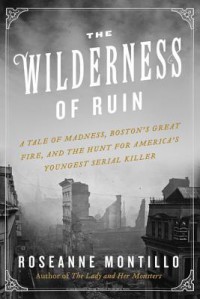Bookworm Blurbs
I absolutely adore reading - my love for books has had a huge impact on my life! I'm going to grad school to be a children's/YA librarian.
The Wilderness of Ruin

In late nineteenth-century Boston, home to Herman Melville and Oliver Wendell Holmes, a serial killer preying on children is running loose in the city--a wilderness of ruin caused by the Great Fire of 1872--in this literary historical crime thriller reminiscent of The Devil in the White City.
In the early 1870s, local children begin disappearing from the working-class neighborhoods of Boston. Several return home bloody and bruised after being tortured, while others never come back.
With the city on edge, authorities believe the abductions are the handiwork of a psychopath, until they discover that their killer--fourteen-year-old Jesse Pomeroy--is barely older than his victims. The criminal investigation that follows sparks a debate among the world's most revered medical minds, and will have a decades-long impact on the judicial system and medical consciousness.
The Wilderness of Ruin is a riveting tale of gruesome murder and depravity. At its heart is a great American city divided by class--a chasm that widens in the aftermath of the Great Fire of 1872. Roseanne Montillo brings Gilded Age Boston to glorious life--from the genteel cobblestone streets of Beacon Hill to the squalid, overcrowded tenements of Southie. Here, too, is the writer Herman Melville. Enthralled by the child killer's case, he enlists physician Oliver Wendell Holmes to help him understand how it might relate to his own mental instability.
With verve and historical detail, Roseanne Montillo explores this case that reverberated through all of Boston society in order to help us understand our modern hunger for the prurient and sensational. (source)
I received this book from the Book of the Month club in June (I think?) and, while it definitely sounded intriguing, I didn't get a chance to read it until you all chose it for me for my August booklikes community pick. You picked a good one! I'm really glad I finally got around to reading this; it was very thought-provoking and especially appealed to my inner history buff.
Montillo definitely researched this book heavily. It's chock-full of quotes and references from sources that were present during the time of these atrocities. I do wish that she had been more specific about which quotes came from which sources - though she lists each source and includes end notes that elaborate on her information, she doesn't explicitly state what comes from where. If I were to critique this from a professional historian's perspective, rather than that of a curious reader, I'd really slam her for that. But, I don't think that Montillo wrote this with the intention of garnering accolades from historians, so her lack of specificity can be forgotten, if not entirely forgiven.
Montillo teased out so much from examining this single psychopath. Rather than simply focusing on Pomeroy and his viciousness, she discusses mental illness, how Pomeroy's case sparked discussion of mental illness and the treatment of criminals, and general politics in the Boston area at the time of these murders. For me, this added depth and vibrance to the book. However, for readers who are interested in this book because of its nature as a true crime book rather than a history book, this might get tedious.
One thing that Montillo tries to do is show how this case impacted some significant American authors at the time, specifically Herman Melville and Oliver Wendell Holmes. While I do think that this is a good idea, I don't think that it was fulfilled as flawlessly as one might hope. I actually found that the sections discussing Melville and Holmes were distracting, especially since they're not always inserted in places where it would make chronological sense. To be honest, after reading this, I'm left wondering what the point was of bringing them into the book in the first place.
Finally, while I did think this was a well-researched, well-written book, I don't know that the title was very aptly chosen. Yes, this is absolutely a tale of madness. However, while the Great Boston Fire of 1872 did coincide with Pomeroy's crimes, after reading this, I'm not convinced that it played a great role in the proceedings of his case, or that it's really connected with his crimes. Furthermore, the hunt for Pomeroy really only lasted for the first few chapters - before he actually murdered anyone. When he did start committing murders, the police were fairly certain that it was he who committed the crimes and from there, they didn't really have to hunt him down - they found him at home, arrested him, and brought him to trial, where he was convicted and ended up spending the rest of his life in prison. So while this is what I would qualify as a "good" book and perhaps the title isn't really a huge deal, it did kind of give me certain expectations that weren't ultimately fulfilled when reading the book.
I really struggled with how to rate this book. I vacillated between giving it a 3.5 star rating or a 4 star rating, and ultimately decided with a 3.5 rating, because if it were deserving of a 4 star rating I don't think I would've been so indecisive about how to rate it. That being said, even though there were parts of this book that I wasn't wholly thrilled with, it did impress me and definitely succeeded in making me think about the topics that Montillo discusses. I think that if you have any interest in true crime books, the topic of mental illness and treatment of criminals who suffer for it, or just a general interest in history, this might be a book that you'd want to read. I don't know that I'll re-read this, but it was definitely well-worth the time I spent reading it this time around!
 7
7 






